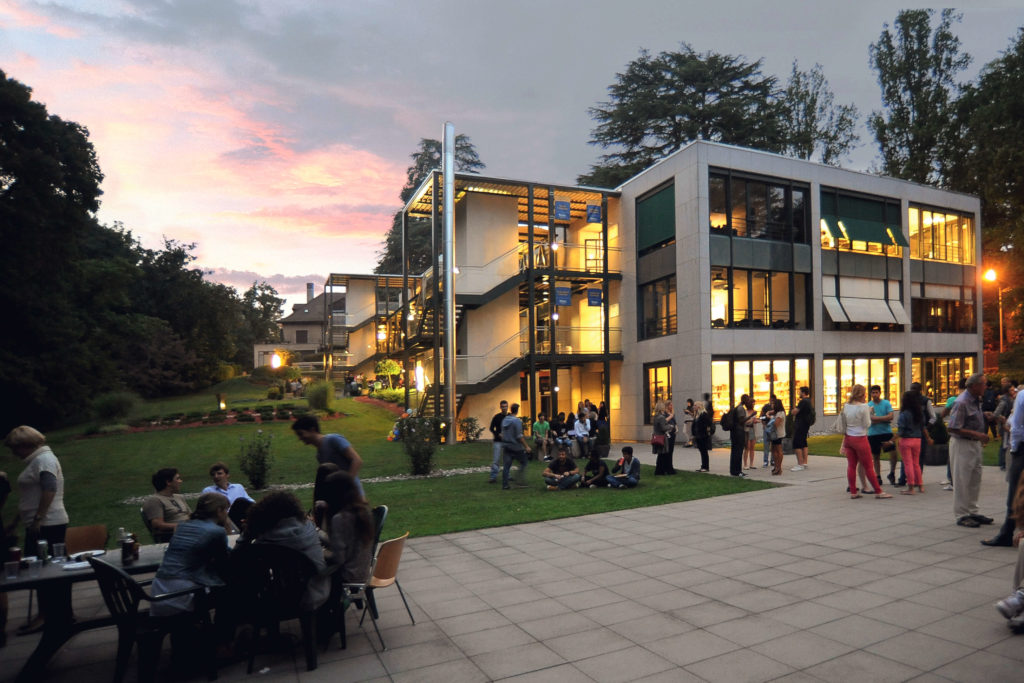University accreditation is a quality assurance process to ensure institutions’ standards and their programs meet the quality requirements set by a government organization or the Confederation. This process has the intention to contribute to accomplishing international acknowledgment and to improve the comparability of degrees.
As stated by swissuniversities.ch, to secure quality in the Swiss higher education area, the Federal Higher Education Act (HEdA) calls for regular assessment of the quality of teaching, research, and services at all higher education institutions.
Further on, we will see what accreditation types there are, how accreditation in Switzerland works, which public and private universities are accredited, and which higher education institutions are equipped with accreditations from other quality labels or other countries.
Higher Education Accreditation in Switzerland

There are two types of higher education accreditation: (1) institutional and (2) programmatic accreditation. Let’s take a more in-depth look at how they work in Switzerland.
Institutional accreditation
Institutional accreditation means that the entire school is accredited, denoting that higher education institutions have effectively carried out quality assurance in conformity with national criteria and international standards.
This institutional accreditation serves as a directory and decision-making support that improves international recognition for degree qualifications and raises a universities’ national and international profile.
As stated by State Secretariat for Education and Research (SERI), there are no international agreements protecting the value of private degrees; in all cases, it is up to the national authorities in the host country to decide whether to recognize foreign qualifications. However, only credits & degrees acquired by institutionally accredited universities are guaranteed to be recognized by public universities nationally and internationally. Therefore, students are advised to research and get informed about the type of accreditation their university of choice has before deciding to apply.
In Switzerland, in conformity with HEdA Accreditation Ordinance, the quality standards for institutional accreditation cover five areas:
- Quality assurance strategy
- Governance
- Teaching, research, and services
- Resources
- Internal and external communication
According to the HEdA, AAQ is the Swiss Agency for Accreditation and Quality Assurance that carries out institutional accreditations in the Swiss higher education area. AAQ is a subordinate to the Swiss Accreditation Council, the decision-making body.
As SERI (State Secretariat for Education, Research and Innovation) points out, private institutions based in Switzerland that are not accredited under the HEdA may only issue private degrees. When it comes to such degrees, generally, the holders can’t carry out a regulated profession in Switzerland (e.g., health, teaching, technology, law, social work); as per unregulated professions, recognition is entirely up to the employer.
Please note: according to AAQ, although it is required by law, not all universities are accredited yet, due to a transition period until 2022. After that, all universities who want to use the designations „Universität, “Fachhochschule“ or „pädagogische Hochschule“ ( “University,” “University of Applied Sciences” or “University of Education”) must be accredited.
Programmatic accreditation
Program accreditation means that programs within an institution are individually accredited. Program accreditors mainly evaluate programs based on criteria such as faculty, curriculum, students, resources, and administrative structure.
In Switzerland, as specified by the Swiss Accreditation Council, HEdA-pursuant program accreditation is voluntary, and only institutionally accredited universities can request it. A list of the agencies that are recognized by the Swiss Accreditation Council to offer program accreditation can be found here.
However, higher education institutions may choose to accredit their programs via other accrediting agencies in Switzerland or other countries (also referred to as programmatic accrediting bodies, organizations, agencies, etc.) that award their own quality label.
As College & Degrees reports, when a school that is not institutionally accredited offers programs accredited by a programmatic accrediting body, that program’s credits do not qualify for transfer to other institutions, and students are not able to receive governmental financial aid.
Moreover, some employers may choose not to hire a potential candidate if the degree they hold was granted by a non-accredited educational institution.
As pointed out by VVConsultant, institutions may choose to accredit individual programs since institutional accreditation can be challenging and expensive. However, individually accredited programs within these institutions can still be valuable for students.
Programmatic accrediting bodies & Quality labels
As mentioned earlier, program accrediting agencies provide a more focused assessment of a specific academic program that is part of an institution. Here is a list of some program accreditation organizations.
CHEA
Council for Higher Education Accreditation (CHEA) is a United States-based non-governmental organization that recognizes institutional and programmatic accrediting organizations.
ENQA
The European Association for Quality Assurance in Higher Education (ENQA) is a membership organization that represents its members at the European level and internationally.
ENQA members are quality assurance organizations from the European Higher Education Area (EHEA) member states that operate in the field of higher education.
EQAR
The European Quality Assurance Register for Higher Education (EQAR) is the EHEA’s official register of quality assurance agencies that comply with the Standards and Guidelines for Quality Assurance in the European Higher Education Area (ESG).
eduQua
eduQua is a Swiss quality label for continuing education institutions. Independent, accredited certification bodies carry out the testing and certification in all regions of Switzerland.
The current eduQua: 2012 standard is currently being revised and geared towards current and future continuing education developments.
ACBSP
The Accreditation Council for Business Schools and Programs (ACBSP) (recognized by CHEA) is a global business education accrediting body offering program accreditation services to business programs focused on teaching and learning.
Its standards for business degree program accreditation are:
- Leadership
- Strategic planning
- Student and stakeholder focus
- Student learning assessment
- Continuous improvement
- Faculty focus
- Curriculum
- Business unit performance
IACBE
The International Accreditation Council for Business Education (IACBE) (recognized by CHEA) is an educational program accreditation agency that offers accreditation to business education degree programs.
Business programs are evaluated based on IACBE’s eight accreditation principles:
- Commitment to Integrity, Responsibility, and Ethical Behavior
- Quality Assessment and Advancement
- Strategic Planning
- Curricula and Learning Opportunities
- Faculty Characteristics, Activities, and Processes
- Student Policies, Procedures, and Processes
- Resources
- External Relationships
AACSB
The Association to Advance Collegiate Schools of Business (AACSB) is a global nonprofit association that connects, shares, and inspires innovation and quality throughout the member network, as well as the business community.
Schools interested in AACSB accreditation must be a member of AACSB’s Business Education Alliance. The accreditation standards consist of three sections:
- Strategic Management and Innovation
- Learner Success
- Thought Leadership, Engagement, and Societal Impact
In 2016, AACSB lost its recognition by the Council for Higher Education Accreditation (CHEA).
AMBA
The Association of MBAs is a global organization that accredits MBA, DBA, and master’s degree programs. The AMBA reports that they review these accredited programs at least every five years to ensure quality and improvements are continuous.
The key accreditation criteria that AMBA uses to assess the quality of programs include:
- Institution and Faculty
- Program Design
- Student Recruitment
- Graduate Attributes
- Curriculum
- Assessment
- Delivery
- Impact and Outcomes
EQUIS
The EFMD Quality Improvement System (EQUIS) is a global, non-profit, membership-driven organization that offers EFMD program accreditation for business and management degrees and courses (e.g., EFMD accredited – MBA).
Its program accreditation process is based upon quality criteria of:
- Institutional Context
- Program Design
- Program Delivery & Operations
- Program Outcomes
- Quality Assurance
Triple accreditation
Triple accreditation, also known as “Triple Crown accreditation,” according to MBA Today, is the combination of accreditations awarded by the three accreditation organizations:
- AACSB – The Association to Advance Collegiate Schools of Business (United States)
- AMBA – The Association of MBAs (United Kingdom)
- EQUIS – EFMD Quality Improvement System (European Union)
Accredited Universities In Switzerland
Switzerland universities are known for ranking relatively high compared to other countries, and the country still remains one of the first choices for local and international students.
Here’s the list of accredited universities in Switzerland.
Disclaim: The following lists of higher education institutions represent a list of private and public universities that we have been able to identify (using public-accessible data) as institutionally accredited institutions. The list does not represent a ranking. If you believe there are other institutions that have an institutional accreditation that are not listed here, please reach us at [email protected]
List of Accredited Public Universities in Switzerland

Public universities in Switzerland are some of the highest-ranking universities in the country. As stated in Wikipedia, public universities are mostly under the authority or control of the cantons in which they are located and are known for having a strong research focus and training their students through research-based teaching.
These universities are all Recognised or Accredited Swiss Higher Education Institutions in accordance with the Federal Higher Education Act, HEdA.
Swiss Federal Institute of Technology Zurich (ETH Zürich)
ETH Zürich offers courses and programs leading to degrees such as bachelor’s, master’s degrees, doctorate degrees in construction sciences, engineering sciences, natural sciences & mathematics, system-oriented natural sciences, and management & social sciences. As SERI states, ETH Zurich is one of the federally run higher education institutions.
Federal Institute of Technology Lausanne (EPFL)
EPFL is a public university and research institute that specializes in engineering and science. Education, research, and innovation are the three main focuses. With campuses in Neuchâtel, Fribourg, Geneva, and Valais, the university offers numerous bachelor’s, master’s, and doctoral programs.
As SERI states, EPFL is one of the federally run higher education institutions.
University of Geneva (UNIGE)
UNIGE is located in Geneva’s heart, composed of nine faculties—Science, Medicine, Humanities, Economics and Management, Social Sciences, Law, Theology, Psychology and Educational Sciences, and Translation and Interpreting. Their motto is “Light after darkness.”
According to the official page, its school of Economics and Management is a member of AACSB and EFMD. At the same time, AMBA has accredited the Executive MBA Program and the International Organizations MBA. AAQ accredits these UNIGE programs:
- MAS in Microinvasive Aesthetic Dentistry
- MAS in Humanitarian Action
- MAS in Children’s Right
- MAS in International and European Security
- MAS in interpreter training
University of Zurich (UZH)
UZH is a university in the German-speaking part of Switzerland made up of seven faculties covering some 100 different subject areas, offering a wide variety of bachelor’s, master’s, continuing education, and Ph.D. programs.
As stated on the official website, The Faculty of Business, Economics and Informatics has program accreditation by AACSB and EQUIS.
University of Bern (UNIBE)
UNIBE is a comprehensive university located in Bern’s heart that offers a broad choice of courses and programs in eight faculties and 160 institutes. Its faculties consist of Theology, Humanities, Human Science, Law, Social Science, Economics And Business, Medicine, Veterinary Medicine, And Natural Science.
The Swiss Accreditation Council accredited the study program in Veterinary Medicine at the Faculty Vetsuisse of the Universities of Bern and Zurich (the merger of the Faculties of veterinary medicine of the Universities of Bern and Zurich.)
University of Lausanne (UNIL)
UNIL is located on the shores of Lake Léman and is close to the Swiss Federal Institute of Technology in Lausanne (EPFL). It offers bachelor’s and master’s study programs in the Social Sciences, Arts, Humanities, Environmental Studies, Earth Sciences, Business, Religious Studies, Life Sciences, and Medicine.
According to the official website, the Faculty of Business and Economics has program accreditation by EQUIS and AMBA.
University of Basel (UNIBAS)
UNIBAS offers courses and programs leading to officially recognized bachelor degrees in several study areas such as Arts & Humanities, Medicine & Health, and Business & Social Sciences.
The Master of Science in Nursing program of UNIBAS is accredited by AAQ.
University of Fribourg (UNIFR)
UNIFR is situated in the bilingual Swiss city of Fribourg. It is divided into five faculties: Humanities, Law, Theology, Science, And Economics & Social Sciences. Almost all subject areas offer students the possibility of taking their courses in German, French, or both.
The University of St. Gallen (HSG)
HSG is a research university located atop Rosenberg hill specializing in business administration, economics, law, and international affairs. Its students can partake in an exchange program with approximately 200 partner universities worldwide.
According to its official page, the University of St.Gallen earned the seal of approval for Tripe Crown accreditation from EQUIS, AACSB, and the AMBA.
University of Lucerne (UNILU)
UNILU is a non-profit public higher education institution located in the large town of Luzern’s urban setting, specializing in religious, social, cultural, legal, and economic sciences.
There are English-taught courses currently offered within the faculties of Humanities and Social Sciences, Law, Economics and Management, and the Department of Health Sciences and Medicine. Furthermore, the University of Lucerne offers three MA programs that can be studied entirely in English.
University of Neuchâtel (UniNE)
UniNE is a public institution with four faculties in Arts and Humanities, Science, Law, and Economics. It offers bachelor’s, master’s, and doctoral degree programs with classes in French and English.
With its modest size, the University is well-regarded for its dynamism and the close level of supervision that its staff provide. It is also renowned for its welcoming attitude to the many students and research staff who hail from almost one hundred different countries, bolstering the institution’s cultural diversity
Bern University of Applied Sciences (BFH)
BFH is a university of applied sciences that, in addition to teaching, also focuses on continuing education, research and development, and consulting services. Inviting programs it offers are Sports, Agriculture, Forest Science, Automotive Engineering, Nutrition And Dietetics, Literary Writing, And Medical Informatics.
As reported by AAQ, the Bachelor of Science in Medical Informatics has program accreditation.
University of Applied Sciences Northwestern Switzerland (FHNW)
FHNW is an institution of higher education involved in teaching, research, continuing education, and service provision. It comprises nine schools Applied Psychology, Architecture, Civil Engineering and Geomatics, Art and Design, Business, Teacher Education, Engineering, Life Sciences, Music, and Social Work.
According to its official website, The School of Business FHNW is a member of the AACSB, and their MAS Corporate Communication Management and MAS Human Resource Management programs are FIBAA accredited.
Lucerne University of Applied Sciences and Arts (HSLU)
HSLU is an educational institution supported by the six cantons of Central Switzerland. HSLU offers English and German-based education with levels from undergraduate to graduate. It offers different courses characterized by cutting edge education.
University of Applied Sciences of Eastern Switzerland (OST)
OST is composed of four member schools located in the different cities of St. Gallen, Rapperswil, Chur, and Buchs. This university significantly contributes to the economic and social development in the region.
Zurich University of Applied Sciences (ZFH)
ZFH is composed of three public institutes of higher education: the Zurich University of Applied Sciences (ZHAW), the Zurich University of the Arts (ZHdK), and the Zurich University of Teacher Education (PHZH), as well as the private institute: the Zurich University of Applied Sciences in Business Administration (HWZ).
As reported by AAQ, these ZHAW programs have program accreditation: BSc Energy and Environmental Technology and M.Sc ZFH in Facility Management.
University of Applied Sciences and Arts Western Switzerland (HES-SO)
HES-SO is a group of higher education institutions situated in French-speaking Western Switzerland that offer various study streams and research activities. It plays a preeminent role in the socio-economic and cultural development of the seven cantons of Western Switzerland.
As reported by AAQ, these HES-SO programs have program accreditation:
- Bachelor of Science in Information Technology Engineering
- Bachelor of Science in Microengineering
- Master of Science in Territorial Engineering
- Master of Science in Documentary Information
University of Applied Sciences and Arts of Southern Switzerland (SUPSI)
SUPSI offers courses and programs leading bachelor degrees and master’s degrees in several areas of study: architecture and construction, design, teacher training, engineering and information technologies, health, business management, social work, music, and theatre.
Accredited Private Universities in Switzerland
There are relatively few private universities in Switzerland who have institutional accreditation. There may be other universities getting institutionally accredited, however, this list includes those who are currently accredited.
The list will be updated based on information reported by the Swiss Accreditation Council (the decision-making body for institutional accreditations.)
Webster Geneva Campus

Webster Geneva Campus is one of the few private universities in Switzerland with Institutional Accreditation and offers an array of degrees such as Business, Media Communications, Computer Science, Psychology and International Relations with a core focus across the curriculums on Liberal Arts, with academic scholarship possibilities on a need and merit-based allocation.
As stated on its official page, the university carries full institutional accreditation from the Higher Learning Commission (HLC), the highest-level accrediting agency for universities based in the north-central region of the U.S.
Furthermore, The Walker School of Business & Technology at Webster Geneva Campus has earned specialized accreditation by ACBSP.
Graduate Institute of International and Development Studies (IHEID)
IHEID is an institution of research and higher education dedicated to the study of world affairs, with a particular emphasis on the cross-cutting fields of international relations and development issues.
It is a federally accredited higher education institution in accordance with the Federal Higher Education Act, HEdA. The Master of Science in Nursing program is accredited by AAQ.
Kalaidos University of Applied Sciences
Kalaidos University of Applied Sciences is a private, federally accredited university of applied sciences in accordance with the Federal Higher Education Act HEdA. It offers degrees in four departments: Business And Management, Kalaidos Law School, Health Science, And Music.
As reported by AAQ, the Master of Science in Nursing program has program accreditation.
SBS Swiss Business School
SBS is a private institution of higher education located in Zurich, Switzerland, offering accredited business programs at the bachelor’s, master’s, and doctoral levels. With a strong focus on global business, innovation, and applied learning, SBS provides students with a practical education in a multicultural environment, preparing them for leadership roles in today’s competitive marketplace.
Franklin University Switzerland

The Franklin University Switzerland is an international university located in the city of Lugano, that offers interdisciplinary, experiential learning, with Academic Travel at the core of its curriculum.
As the university reports, Franklin University Switzerland is institutionally accredited in Switzerland by the Swiss Accreditation Council and by the Middle States Commission on Higher Education (MSCHE), one of the seven regional accreditation organizations in the U.S. In 2018, Franklin was recognized by the Chinese Ministry of Education 中华人民共和国教育部 as an accredited foreign university.
Switzerland is very serious when it comes to accreditation of universities. Their most recognized universities are public schools. However, they have their fair share of accredited private institutions and schools recognized by international accreditation institutions. We hope this list helped you understand how accreditation works and which universities are officially accredited by Swiss institutions. Lastly, if you intend to start your studies in Switzerland, you should know how student visas work and what to expect from your student life. Good luck!



Hello,
James Lind Institute is widely advertised as offering MPH programs but I do not see it in your listing. Is there a reason for that?
Hi please let me know when you find out more about james lind institute. I am trying to find out about the institute. Thnks
Hello,
I would like to know if you got any answer, I applied to study at Rushford Business School and they offered admission.
Thank you.
This list may not be up to date. I can see that a lot of Schools with EduQua logo are not listed.
Swiss School of Business Research (SSBR) is not on this list but has EduQua logo. Any reason for this?
Is Robert Kennedy College accredited?
Hi, I like to know if rochat school of business is acredited it ofers online programs and it is supposed to have headquarters in Switzerland. Thanks !
Hi , i would also like to ask the same question. James Lind Institute is widely advertised as offering MPH programs but I do not see it here. Is there any reason for this
James Lind is widely advertised as an institution in Switzerland offering mph but not in this listing, what could be the reason
Hello, I am enquiring about the James Lind Institute, Is this institute accredited?
Hello, I was searching for MBA at Rushford Business School and accredited and i do not see it in your listing as well. Is there a reason for that?
Hi,
Am also greatly considering a MPH from James Lind Institute but dont see it here. Please respond with any comment.
Is james lind institute accredited
Hello, Can you advice if online MBA from Swiss School of management is either accredited institutionally or Programmatically ?
Hello,
What about SSBM (Swiss School of Business and Management Geneva) ? Arent they a accredited university in Switzerland? Their website is (https://www.ssbm.ch).
Hi,
Greetings!
Hope you are doing well.
Just wanted to understand about private institute in Switzerland offering professional course outside the Switzerland is considered legal by Swiss administrative / authorities.
Regards
Saleem
India
Hi,
I received my DBA from Swiss management center university,but its accreditation is not in your list. Would you please tell me its reason?
Thanks